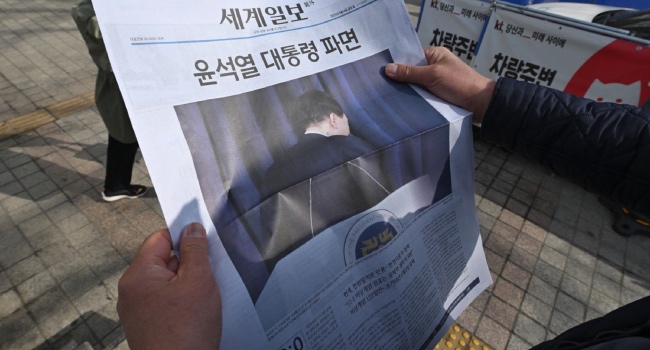In a historic ruling on Friday, South Korea’s top court officially removed President Yoon Suk Yeol from office, following his controversial declaration of martial law that led to political chaos. This ruling triggers a new presidential election, scheduled to take place within the next 60 days.
Yoon, 64, was suspended by lawmakers after his attempt on December 3, 2025, to undermine civilian authority, including deploying armed soldiers to parliament. He has also faced arrest on insurrection charges as part of a separate investigation.
The public witnessed the court’s landmark decision live on television, with a surge in traffic on the nation’s popular messaging app, KakaoTalk, causing delays for some users.
Acting Court President Moon Hyung-bae explained the decision, stating, “Given the serious impact and far-reaching consequences of the respondent’s constitutional violations… We dismiss President Yoon Suk Yeol.”
The ruling is immediate, effectively removing Yoon from office and setting the stage for new elections. The authorities are expected to announce an election date shortly.
As the court’s decision was read, Yoon’s supporters outside the courthouse voiced their outrage, making threats against the judges. These judges, however, stood firm in their ruling, citing Yoon’s violation of the core principles of law and democracy.

Yoon’s actions, including the deployment of soldiers to stop lawmakers from voting against his martial law decree, were deemed a violation of the political neutrality of the military, with the court stating that troops had been used for political purposes.
“In the end, the respondent’s unconstitutional and illegal acts are a betrayal of the people’s trust and constitute a serious violation of the law,” the ruling concluded.
While opposition lawmakers hailed the verdict as a victory for democracy, Yoon’s supporters were visibly upset. Outside his residence, emotions ran high as news of his impeachment spread.
This marks a significant moment in South Korea’s political history, with Yoon now becoming the second president in the country’s history to be impeached, following Park Geun-hye in 2017.

The court’s decision follows months of political unrest, with the country enduring a leadership vacuum and multiple crises, including a deadly wildfire and an aviation disaster. South Korea also faced economic challenges, including a sharp tariff increase imposed by the United States on exports.
Following the ruling, National Assembly speaker Woo Won-shik emphasized the significance of the decision, saying, “We have reaffirmed that no one in the Republic of Korea can be above the law.” He added that any unconstitutional acts must be held accountable.
In the wake of the ruling, the Korean won saw a sharp increase against the US dollar, with the stock market showing slight gains.
For now, acting President Han Duck-soo will continue in his role until the fresh elections are held.


